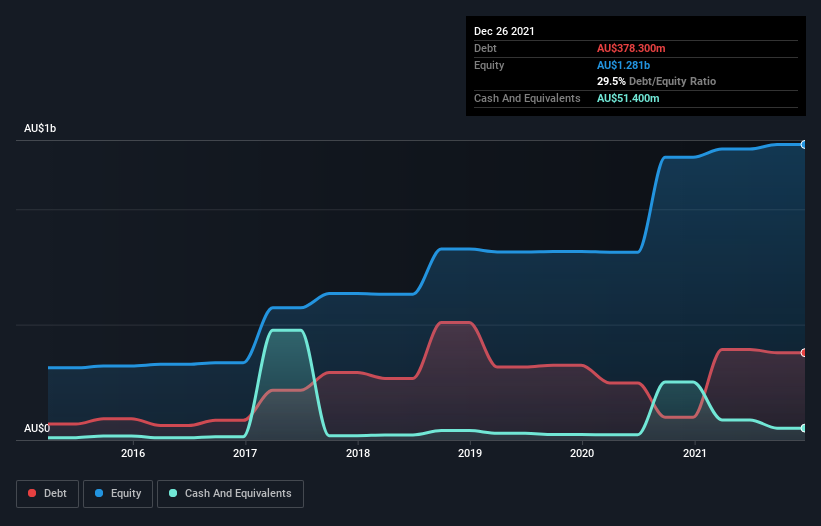
Legendary fund manager Li Lu (who Charlie Munger backed) once said, 'The biggest investment risk is not the volatility of prices, but whether you will suffer a permanent loss of capital.' So it might be obvious that you need to consider debt, when you think about how risky any given stock is, because too much debt can sink a company. We can see that Bega Cheese Limited (ASX:BGA) does use debt in its business. But the more important question is: how much risk is that debt creating?
When Is Debt Dangerous?
Debt and other liabilities become risky for a business when it cannot easily fulfill those obligations, either with free cash flow or by raising capital at an attractive price. Ultimately, if the company can't fulfill its legal obligations to repay debt, shareholders could walk away with nothing. However, a more usual (but still expensive) situation is where a company must dilute shareholders at a cheap share price simply to get debt under control. Of course, debt can be an important tool in businesses, particularly capital heavy businesses. The first thing to do when considering how much debt a business uses is to look at its cash and debt together.
See our latest analysis for Bega Cheese
What Is Bega Cheese's Debt?
The image below, which you can click on for greater detail, shows that at December 2021 Bega Cheese had debt of AU$378.3m, up from AU$98.6m in one year. However, because it has a cash reserve of AU$51.4m, its net debt is less, at about AU$326.9m.

How Healthy Is Bega Cheese's Balance Sheet?
Zooming in on the latest balance sheet data, we can see that Bega Cheese had liabilities of AU$592.9m due within 12 months and liabilities of AU$547.4m due beyond that. Offsetting this, it had AU$51.4m in cash and AU$305.1m in receivables that were due within 12 months. So it has liabilities totalling AU$783.8m more than its cash and near-term receivables, combined.
While this might seem like a lot, it is not so bad since Bega Cheese has a market capitalization of AU$1.48b, and so it could probably strengthen its balance sheet by raising capital if it needed to. But we definitely want to keep our eyes open to indications that its debt is bringing too much risk.
In order to size up a company's debt relative to its earnings, we calculate its net debt divided by its earnings before interest, tax, depreciation, and amortization (EBITDA) and its earnings before interest and tax (EBIT) divided by its interest expense (its interest cover). This way, we consider both the absolute quantum of the debt, as well as the interest rates paid on it.
Bega Cheese's net debt to EBITDA ratio of about 2.2 suggests only moderate use of debt. And its commanding EBIT of 12.9 times its interest expense, implies the debt load is as light as a peacock feather. Importantly, Bega Cheese grew its EBIT by 65% over the last twelve months, and that growth will make it easier to handle its debt. When analysing debt levels, the balance sheet is the obvious place to start. But ultimately the future profitability of the business will decide if Bega Cheese can strengthen its balance sheet over time. So if you want to see what the professionals think, you might find this free report on analyst profit forecasts to be interesting.
Finally, while the tax-man may adore accounting profits, lenders only accept cold hard cash. So we clearly need to look at whether that EBIT is leading to corresponding free cash flow. Over the last three years, Bega Cheese actually produced more free cash flow than EBIT. There's nothing better than incoming cash when it comes to staying in your lenders' good graces.
Our View
Bega Cheese's interest cover suggests it can handle its debt as easily as Cristiano Ronaldo could score a goal against an under 14's goalkeeper. But truth be told we feel its level of total liabilities does undermine this impression a bit. Zooming out, Bega Cheese seems to use debt quite reasonably; and that gets the nod from us. After all, sensible leverage can boost returns on equity. Of course, we wouldn't say no to the extra confidence that we'd gain if we knew that Bega Cheese insiders have been buying shares: if you're on the same wavelength, you can find out if insiders are buying by clicking this link.
If, after all that, you're more interested in a fast growing company with a rock-solid balance sheet, then check out our list of net cash growth stocks without delay.
Valuation is complex, but we're here to simplify it.
Discover if Bega Cheese might be undervalued or overvalued with our detailed analysis, featuring fair value estimates, potential risks, dividends, insider trades, and its financial condition.
Access Free AnalysisHave feedback on this article? Concerned about the content? Get in touch with us directly. Alternatively, email editorial-team (at) simplywallst.com.
This article by Simply Wall St is general in nature. We provide commentary based on historical data and analyst forecasts only using an unbiased methodology and our articles are not intended to be financial advice. It does not constitute a recommendation to buy or sell any stock, and does not take account of your objectives, or your financial situation. We aim to bring you long-term focused analysis driven by fundamental data. Note that our analysis may not factor in the latest price-sensitive company announcements or qualitative material. Simply Wall St has no position in any stocks mentioned.
About ASX:BGA
Bega Cheese
Bega Cheese Limited receives, processes, manufactures, and distributes dairy and other food-related products in Australia.
Excellent balance sheet with moderate growth potential.
Market Insights
Community Narratives



